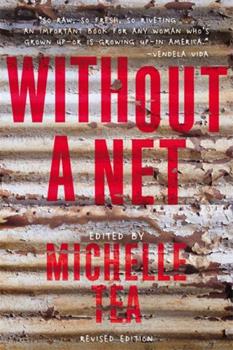
My review of: Without a Net: The Female Experience of Growing Up Working Class 2nd edition - Edited by Michelle Tea
Without a Net is a collection of personal essays written by both notable and average women, about their childhood experiences living below the poverty line. Most of these women went on to rise out of their class and achieve some higher level of success – either financial, or celebrity, or both, and in their personal essay for Without a Net, many remark on the disconnect between the two experiences they have lived. Michelle Tea was inspired to compile this book after writing her own memoir, The Chelsea Whistle, about her working-class experience in Massachusetts. Touching upon the experience of being among the working poor, as well as the misogyny women face in industry and social class, Without a Net is a cultural critique of the sexism that pervades society, and also an education in survival strategies. I chose this book as I am writing a cultural critique and informative narrative as well. My project is about, and targeted to, women working in the tech industry, rather than living in poverty. The appeal of Without a Net comes from how personal and relatable these authors’ stories are, but also how different they are from each other. A handful of the contributors are authors today, but for those who are not skilled writers, Michelle Tea has edited their essays just enough to make the grammar clear but keep their voices intact. By leaving the essays in the contributors’ own voices, the book avoids becoming voyeuristic or sensationalist, and instead brings the reader into each writer’s unique experience. For those readers who grew up in similar circumstances, Without a Net becomes a supportive read, where one might feel that they are not alone. For readers who have never experienced the gritty underbelly of poverty, it is informative, enlightening, and eye-opening as well. The stories span from young women who had to steal, strip, or otherwise break the law to survive, to others who may have scraped by without illegitimate means, but barely did so. They capture the raw, pervasive trauma that poverty causes even when it is no longer a worry. Acclaimed author Ijeoma Oluo’s essay, The Burden of Enough, is an example which paints an informative picture about the systemic effects of childhood poverty: "It turns out that even when the bills are paid and it’s been years since a call I answered was met with a voice saying “this is an attempt to collect a debt,” the panic attack still comes whenever the screen on my phone says “unknown.”"
Enlightening and thought-provoking, this book informs my own writing in an inspiring way. As editor, Michelle Tea captures the voice and style of each contributor in a unique and coherent manner, but still shows their independence and personality. My own nonfiction work incorporates a handful of voices from women with a variety of backgrounds and experiences, and I hope to represent this same differentiation in voice while maintaining the overall message arc for my project.
0 Comments
Leave a Reply. |
OpinionsThese reviews and opinions are exclusively my, Emily's, own. I don't know these authors or people and I'm not paid to gush about them (although I've always wanted to get into that influencer lifestyle.) Archives
September 2023
Categories |
 RSS Feed
RSS Feed